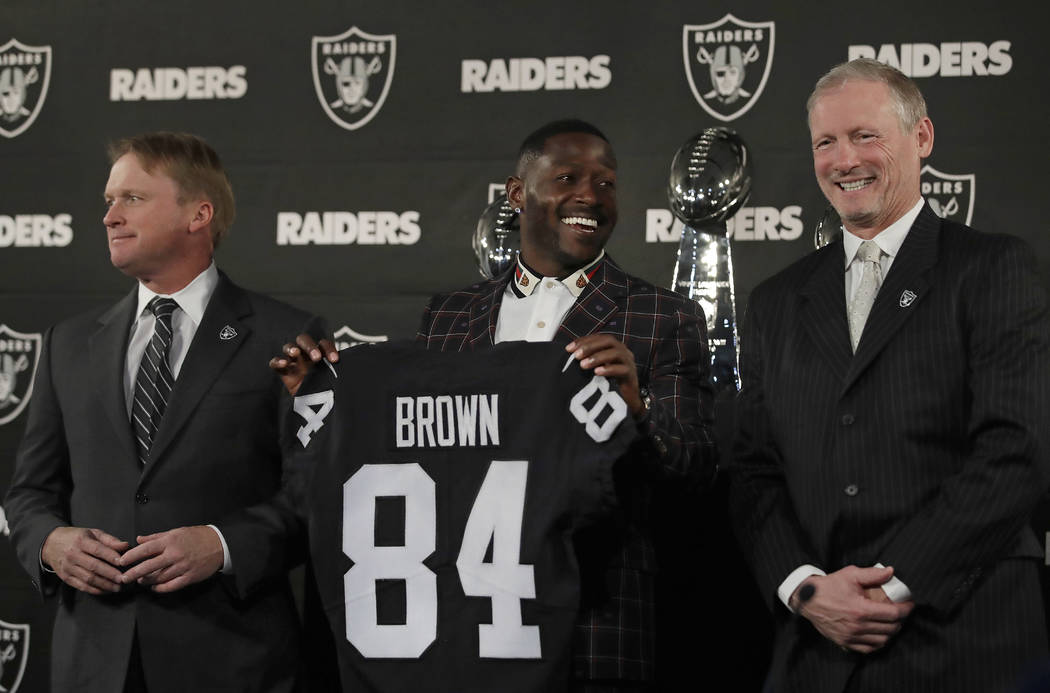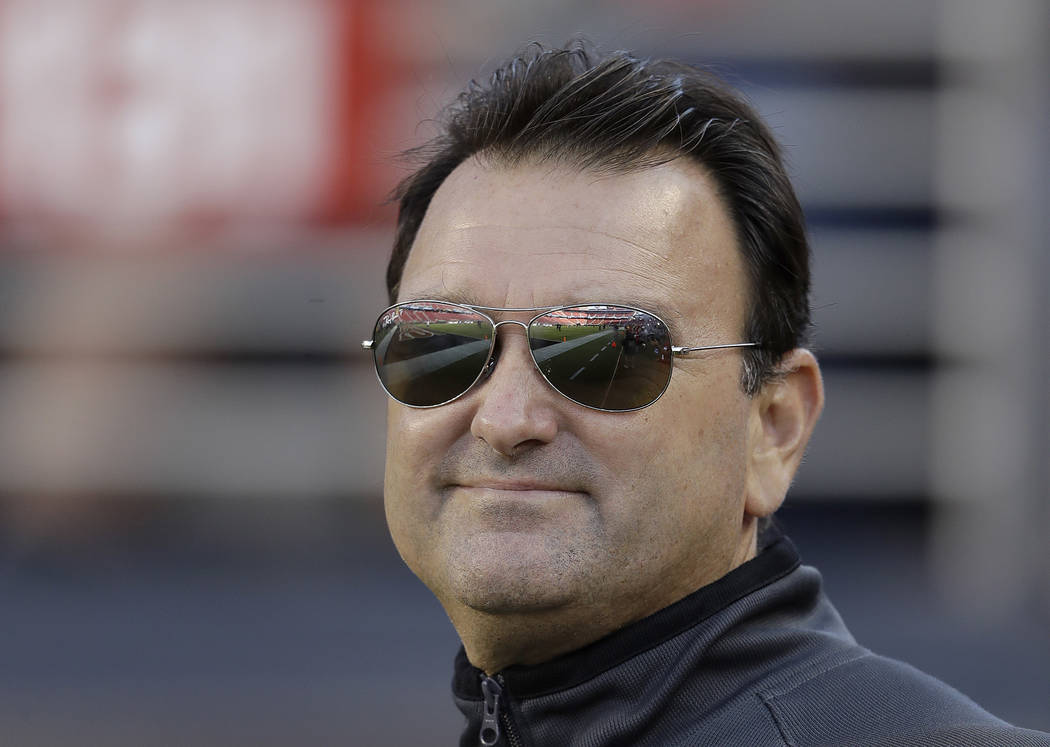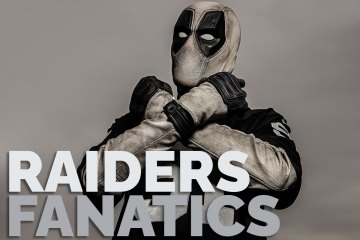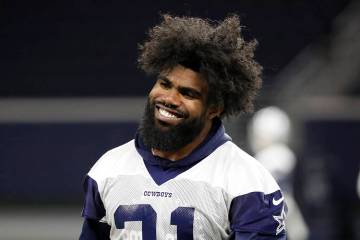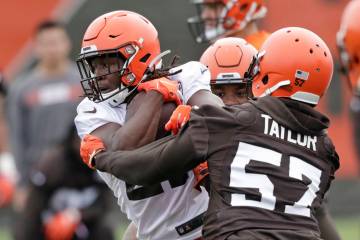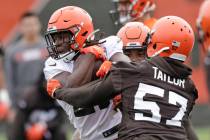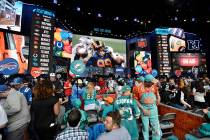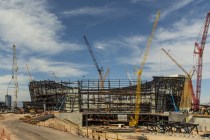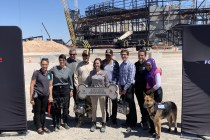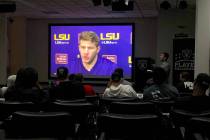Raiders’ money riding on timely move to lower-tax Nevada
OAKLAND, Calif. — Trent Brown is used to waiting.
The 380-pound tackle was the 45th of 46 offensive linemen drafted in 2015. Stability did not come quickly; he played under a different head coach and position coach in each of his first four NFL seasons. On March 11, after the Raiders offered him a four-year, $66 million contract, Brown celebrated with family and agent Drew Rosenhaus.
He waited until the evening to process the moment more fully.
“I shed a few tears,” Brown said. “Not in front of my family and Drew, but definitely that night behind closed doors.”
The Raiders recently made Brown the highest-paid offensive lineman in NFL history. By design, his 2019 earnings do not reflect that.
His contract is one example of an offseason trend in which some agents negotiating larger contracts with the Raiders pushed substantial guaranteed money into 2020 to capitalize on the tax implications of the franchise’s relocation to Las Vegas.
The club is based in California, which taxes top-bracket earners at a nation-high 13.3 percent of state income. In 2020, the Raiders are scheduled to move to Nevada, one of seven states with no state income taxes. By slowing the flow of guaranteed money, agents sought to siphon more wages into Nevada and thereby increase a player’s take-home earnings.
Arguably, no deal embodies this approach better than Brown’s.
He broke barriers for offensive linemen with a deal worth $16.5 million annually and $36.25 million fully guaranteed at signing. But for 2019, he pockets only $15.25 million of it, making him the fourth-highest earner among linemen for the year, according to Spotrac. In 2020, these cash earnings make a 40.1 percent jump to $21.5 million.
Brown is due a $21.25 million guaranteed salary that year.
To convey state taxes’ impact on net income, if the Raiders theoretically were to play all eight home games in California in 2020, nearly half of his salary would be tied to the state. That amounts to $10 million. Of it, 13.3 percent would be subject to state taxes, or $1.33 million.
In Nevada, Brown keeps that $1.33 million.
Factors such as contract worth, scheme fit, team role, comfort with coaches, and club location widely are considered more influential on a player’s decision to join a team than variable state taxes. That said, Nevada’s financial structure was a selling point the Raiders anticipated when entering free agency, knowing contracts could be structured in a manner that would make them a more desirable destination.
Las Vegas, simply put, could help Oakland.
“I don’t think there’s any doubt about it,” general manager Mike Mayock said Feb. 27 at the NFL scouting combine. “We can’t counsel them on tax matters, technically and legally, but I think they’re all aware of it. Once we get into starting to structure contracts that cross over into the Nevada time frame, we’ve already seen a bunch of agents ask questions and want to know when it’s going to be.
“Really, the genesis of that is, hey, you go from 13 percent to zero percent. That’s pretty good pop in a contract.”
Particularly with deals of this scale.
Brown, wide receiver Antonio Brown, safety Lamarcus Joyner and receiver Tyrell Williams signed deals worth a combined $202.425 million, or $13.495 million per season. They included $109.675 million in limited or full guarantees. Not all deals incorporated Nevada into them. Williams, for example, has no full guarantees in 2020, thus removing that option from the table.
Maximizing earnings
Player agent Sunny Shah negotiated Joyner’s contract with Nevada in mind.
Joyner, 28, can pocket $9.05 million in 2019 before taxes and other dues on his four-year pact worth $42 million. His cash flow rises 43.1 percent to $12.95 million in 2020 largely because of an $8 million roster bonus. Despite Joyner not being paid this $8 million until 2020 and it counting against the 2020 salary cap, the contract’s language stipulated that it become fully guaranteed just days after his signing.
“When we’re structuring these deals,” Shah said in a phone interview, “you want to try to structure it in a way that you can maximize your clients’ earnings and take advantage of the benefit that the team is actually moving to a state with no state tax. When we were structuring Lamarcus’s deal, his guarantees primarily are in the first two years. So we wanted to structure it in a way that we can take advantage of it as much as we could.”
Agent Doug Hendrickson applied the same approach on nose tackle Johnathan Hankins’ two-year, $8.5 million extension. Hankins can earn up to $2.5 million this year. The rest comes in 2020, when $1.5 million of his $3.75 million salary and a $1.75 million roster bonus are fully guaranteed.
Rosenhaus negotiated both Antonio Brown’s and Trent Brown’s contracts.
Like Trent Brown, Antonio Brown became the highest-paid player at his position in NFL history. Unlike Trent’s contract, Antonio’s features a more even distribution in guaranteed cash earnings between 2019 and 2020. Antonio nonetheless benefits from playing half his home games in 2020 in Nevada.
“I just think it makes sense for your clients if you can take advantage of that,” Rosenhaus said. “We try to do it when we can, and it’s a unique situation where you’re signing a contract in one place and then you’re going to go to another. It just happened to work for Trent, and it will be a positive for Antonio from that standpoint.
“Vegas is an exciting place. Being a part of a new city in the NFL and a new stadium, a new facility is going to be exciting for all the guys on this team. It just added more incentive for us to work out a deal.”
Raiders players push guaranteed money into the future with hopes to boost earnings.
There is no guarantee the tactic will work.
‘Wild, wild West’
Jarrett Perry is founder and CEO of Player Performance First, a Florida-based accounting firm that specializes in professional sports. He devises and implements strategies to maximize returns for clients, such as advising players on where to spend their bye week or handling the tax implications of suspensions, fines and duty days.
Antonio Brown is one client.
Although he declined comment on specifics related to Brown’s contract, citing client privilege, Perry spoke generally about the tax-law quirk the Raiders’ relocation presents and potential challenges for any player seeking 2020 Nevada savings on money guaranteed during a 2019 negotiation.
One is California.
“They’re going to want those taxes,” Perry said in a phone interview. “They know this situation is happening. They’re not blind to it. So, I think they’re going to be watching it. You don’t have any existing case law. When you don’t have any existing case law to rely on, it makes it very tough to (navigate). … We’ve got the state tax code, but they’re very generic with how they reference this stuff. California tries to write the law so they can snag anything they want as long as they can tie it to California in some way.
“That’s why it’s really important that the team’s (annual income) reporting reflects whatever it is that you’re putting in your contract and hoping to accomplish. We don’t have any control over that. It’s definitely like the wild, wild West. It’s all gray. I don’t think anybody that is (negotiating) these contracts could say, ‘Oh, for sure, we feel 100 percent confident that he’s not going to pay California taxes on it.’ There’s no way to say that. There’s nothing existing that’s out there that says, ‘This guy did this. This is how he did it.’ ”
The Raiders expect their $1.8 billion, 65,000-seat stadium in Las Vegas to open on time for the 2020 season.
It’s possible, however, a construction snag delays their relocation by one year. This would render all talk about 2020 savings moot, a disappointment to players who envisioned avoiding California’s taxes as much as possible. And if indeed the relocation is postponed, that would mean players, by deferring cash flow, forfeited the opportunity to accrue interest on that amount in 2019.
With a potential 13.3 percent reward, agents and players are rolling the dice on Las Vegas before the Raiders arrive.
They hope it’s worth the wait.
More Raiders: Follow at review
Contact reporter Michael Gehlken at mgehlken@reviewjournal.com. Follow @GehlkenNFL on Twitter.




